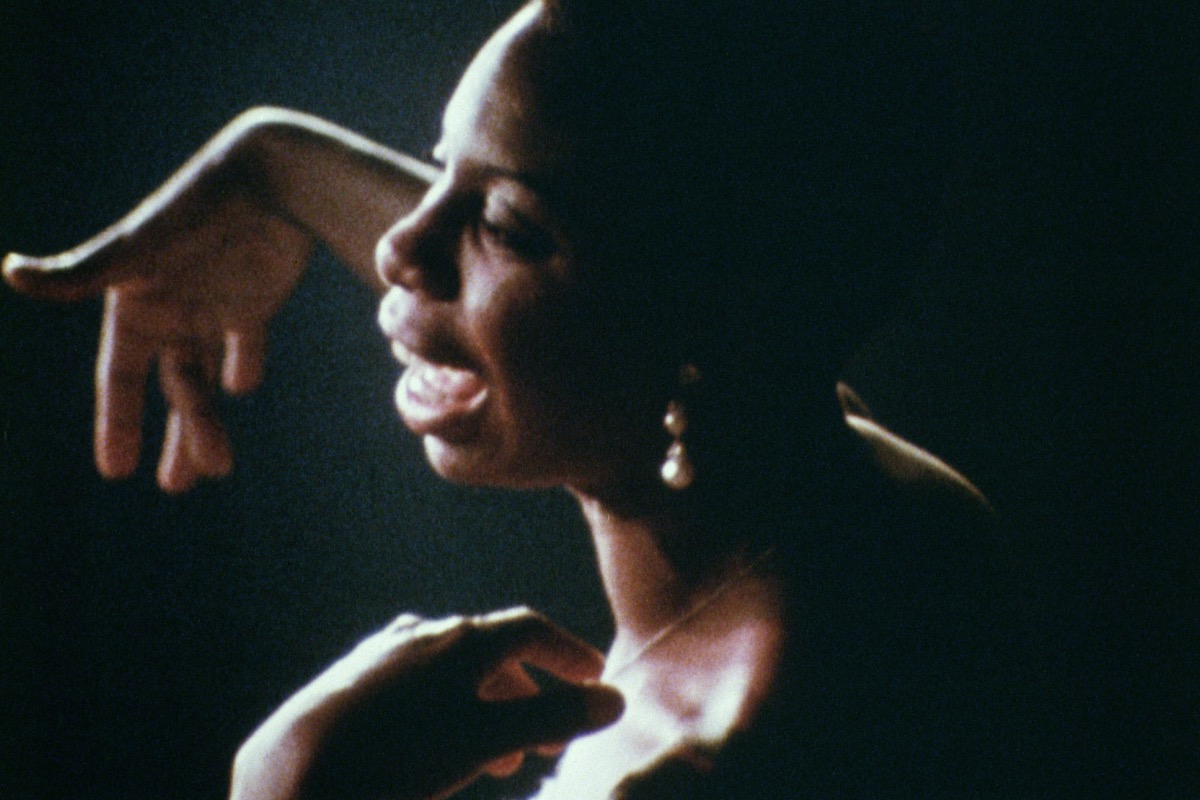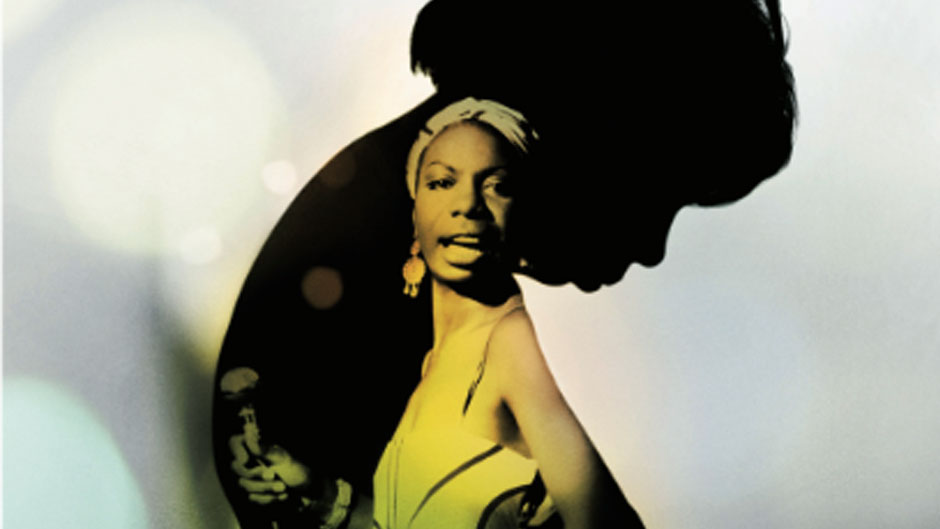Nina Simone on Film: Two approaches
 Scott Pfeiffer
Scott Pfeiffer  Friday, April 8, 2016 at 02:59PM
Friday, April 8, 2016 at 02:59PM 
Two documentaries have appeared within the last year or so about Nina Simone, musical genius and rebel. Both appear ahead of Cynthia Mort's feature Nina, with its controversial casting of the relatively fair, beautiful-by-European-standards Zoe Saldana as Simone. Many have taken this as the final insult, and it certainly seems at least the final irony. Maybe Saldana will give a great performance: while Nina has been in the can for a couple of years now, it is only now being released, later this April. A priori critques have pointed out that Saldana had to don makeup and prosthetics in order for the movie to grapple with what was, after all, the existential truth of Simone's life, which was that she lived in a land where her skin was "too dark," her nose "too wide."
First, Karolyn and I popped over to City Winery to see a special screening of The Amazing Nina Simone by Jeff L. Lieberman, an independent, personal project made with the participation of Simone's bothers (most prominently Sam Waymon, who also played organ in her band). It's an absorbing and passionate, yet frustrating, tribute by Lieberman, who wrote, directed and produced. His film celebrates the great freedom singer, and his focus is on the 60s, her greatest years. City Winery has a tremendous sound system, and the music sounded great--as did the grain of that bracing, beautiful voice. (And the wine we ordered was quite nice, as well). Sadly, the film was projected on two rather tiny, faraway screens. Bigger screens when you show films, please, City Winery, so we in the back needn't squint.
The next day, I had a look at What Happened, Miss Simone? by Liz Garbus, a relatively big-budget production streaming on Netflix, and made with the cooperation of Simone's daughter, Lisa Simone Kelly. She does not appear in Amazing, nor do Simone's brothers appear in What Happened?
Both tell the story of the life behind the music, well-encapsulated by Claudia Roth Pierpont in her fine article in the New Yorker of August 2014, A Raised Voice.
This was a life, and these were times, full of so much pain. So much violence and torment. As Simone famously told Dr. King the very first time they met: "I'm not nonviolent."
But it began as the story of Eunice Waymon, a gifted young girl born in Tryon, North Carolina in 1933. A special teacher changed her life--her piano teacher, Muriel Mazzanovich. Eunice called her Miz Mazzy, or “my white momma.” She instilled in Eunice a life-long love of Bach and her dream of becoming the first great black classical pianist (a dream dashed when, years later, she was rejected by the Curtis Institute of Music in Philadelphia).
"Yet as rare as the little girl’s musical gifts," writes Pierpont in an acute observation, "is the way that, in that time and place, those gifts were encouraged."

Both films are good and worthy. Any project devoted to honestly grappling with the subject of Nina Simone--the amazing, amazing Nina Simone--is one that is manifestly worth doing, and worth your time. These pictures both do that job, and do it in good faith.
Still, it must be said that Garbus' What Happened, Ms. Simone is the better film. It's not just a matter of a bigger budget, but of fashioning the material into something dramatic and cinematic. In terms of the prose of the two films, The Amazing Ms. Simone is relatively prosaic compared to What Happened. Bound and determined to march us briskly through Simone's entire life story, Lieberman is a good storyteller, and yet as the facts accumulate, his approach begins to feel slightly didactic.
On the other hand, Lieberman's film feels more personal. This is his baby.
I do think Lieberman does a better job than Garbus/Netflix of handling a key incident in Simone's life: as young Eunice sat down to give a piano recital at the age of 11, she noticed her parents being shuffled to the back of the hall to make room for a white couple. She refused to play until they were reseated in the front row. In Lieberman's film, the story is told by Nina's brother; in Garbus, it is dramatized, fleetingly. The way the scene plays in our imagination is more vivid.
A key interview in both films is Al Schackman, a guitarist with a lovely touch who played with Simone for 40 years. From the beginning in the late 50s, Simone and Schackman had an uncanny, wordless communication; onstage, it is something to see. Their bond was forged in the crucible of the 60s. Both films include footage of them playing the song she'd written in the wake of the Birmingham church bombing of 1963, "Mississippi Goddam," at the end of the Selma to Montgomery March. It was March 25, 1965, and they are together there in the spotlight, sending the protest song out into the pitch-black, violent air of the night.
Both films explore what it might feel like to be free, to live without fear, but What Happened? affords us more glimpses of those moments when Simone lived out what that might mean--and those moments occurred onstage. "I had a couple of times on stage when I really felt free," she once said. When she sings, we see joy, we feel freedom. These are the times we glimpse that galvanic smile. ("Galvanic smile" is a turn of phrase I liked in a recent short story by Kevin Canty in The New Yorker: I immediately thought of Simone). Her fierce dignity is contagious. I think of the footage of "To Be Young, Gifted and Black" performed at Morehouse College in 1969 in What Happened. Students--young women--sing along, their faces beatific.

For me, the revelatory part about seeing Lieberman's The Amazing Nina Simone with a live audience was when we got to "Four Women." When she hit that number, a section of the audience erupted in cheers. Wow, I thought--that one truly speaks to people, to this day. Strangely, I don't recall the song being featured in What Happened. Nor, come to think of it, do I recall the Netflix production including one of my favorites, her truly scarifying version of Brecht/Weill's "Pirate Jenny." It's in the Lieberman: it sent shivers up my spine when it came over the City Winery sound system.
Lieberman's approach is interview-heavy: he touts the fact that his film includes over 50 interviews. These are mostly good and interesting. However, herein lies the crux of the problem. Often a performance is just gaining steam when someone interrupts. You can't show the whole thing, true, but we're often left wishing for just a bit more. When, late in the film, we see her play some breathtaking piano, in footage from a late-period concert--her gifts had partially been restored, after she finally got some helpful medication--it comes as a surprise when the moment is not immediately interrupted.

Hers was a life more shadowed than most by darkness, and opportunities for sensationalism abound. In her later years, hope went missing as she was consumed by mental illness and rage and loneliness. Great friends like Lorraine Hansberry and Langston Hughes were gone, MLK was gone. One of the a priori critiques of the upcoming Hollywood biopic is that it appears to focus on her erratic, wild behavior during these years.
Both documentaries mainly veer away from the sensational, though What Happened? perhaps rather lingers on the twisted psycho-sexual, co-dependent relationship between Simone and her husband/manager Andy Stroud. Stroud was not interested in the revolution: he was interested in making a buck. Still, his discipline kept her in shape to perform and got her to the stage of which she'd always dreamed--a concert at Carnegie Hall, in 1963. He was also in the habit of beating her up, and worse. What Happened? features interview footage of the man. Their daughter, Lisa Simone Kelly, tells us that after her parents broke up, she eventually settled in to live with her dad after a disastrous sojourn with her mother in Liberia, where Simone was in full-on "mommy dearest" mode. Of her mom and dad, she reckons they "were both crazy." "I love physical violence," Simone once wrote in her diary.
Now, this is one kind of truth, but it's not the truth of why people love Nina Simone. That truth can be found in her records and live performances, where she could be gentle and loving, as well as terrifying and exhilarating. I tend to agree with Lieberman that, as he put it in the Hollywood Reporter, such things are distractions from Simone's "phenomenal musical accomplishments and civil rights stands," the way "she became an international symbol of freedom, pride and artistry."
So, see both of these films. They tell one hell of a sad story, yes, but when she sings, the truth of the life force keeps breaking through. At such moments, the story couldn't be more uplifting. And that's why you shouldn't stop with these two versions of her tale. Do a deep dive on YouTube, watch Nina Simone sing and play in full concerts and live clips. You'll come away with soul and spirit charged.


Reader Comments (2)
Wonderful reviews as always. I'd love to see these films. Last evening we saw "I'll walk the line." It was good, but a very sad life for Hank Williams and his family.
Thanks so much for reading, mother!